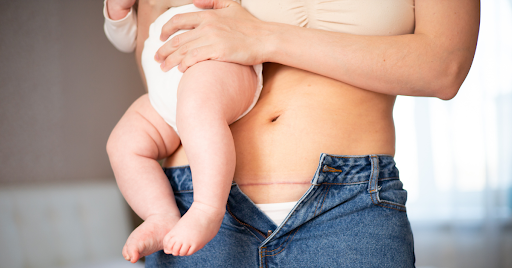For many, the act of giving birth remains a mysterious and somewhat taboo topic. Yet, this magical bodily function is what brings our children into existence and fills our world with more joy than one thought imaginable. All types of birth should be celebrated, not shrouded. In fact, information on pregnancy, labor, and c-sections should be accessible to all, as it is vital to the health and well-being of all expecting mothers.
What Are C-Sections?
C-sections are used to deliver a baby through surgical incisions made in a woman’s abdomen and uterus. It’s estimated that nearly 30% of births in the United States are by c-sections. That number is much higher in older women and women who have multiple children. While there is no single reason why c-sections may be necessary, a few factors can tip the scales to this option being most suitable. Raleigh OB/GYN would like to take this opportunity to help address some of these questions and concerns.
Prolonged Labor
Prolonged labor, commonly referred to as “failure to progress,” is when labor stalls or occurs too slowly. Labor that continues for an extended period of time is dangerous and may cause conditions in the baby, such as low oxygen levels or an abnormal heart rhythm. According to WebMD, if your baby is not born approximately 20 hours after regular contractions, you are thought to be in prolonged labor. If the baby has not progressed far enough down the birth canal and medication does not help to speed up and strengthen the contractions, the doctor may suggest a c-section.
Abnormal Positioning In The Womb
The ideal position for a baby to be in for labor is head down while facing the mother’s back with its chin tucked to its chest. Most babies end up positioned here within the 32nd to the 36th week of pregnancy. Unfortunately, not all babies are ideally positioned like this when it comes time to give birth. Other positions a baby can be in before childbirth include:
- Occiput or cephalic posterior position
- Frank breech
- Complete breech
- Transverse lie
- Footling breech
In many cases, if your baby is in a breech position or transverse lie, your doctor may recommend a c-section instead of a vaginal birth.
Cephalopelvic Disproportion (CPD)
Cephalopelvic disproportion is rare, yet another reason c-sections may be necessary. CPD occurs when a baby’s body or head is too large to fit through the mother’s pelvis or birth canal. According to the American College of Nurse-Midwives (ACNM), CPD occurs in 1 out of 250 pregnancies. When an accurate diagnosis of CPD is made, the safest option for delivery is a c-section.
Chronic Health Conditions
Sometimes, a vaginal birth may not be suitable due to pre-existing medical conditions that could harm the mother, baby, or both. Some chronic health conditions that may warrant a cesarean delivery include conditions like high blood pressure, heart disease, or gestational diabetes. Additionally, a c-section may be suggested if the mother has infections that could be transferred to the baby through vaginal delivery, such as HIV or genital herpes.
Twins Or Carrying Multiples
What’s better than one baby? Two or more! It’s been estimated that roughly 60% of twins are born via cesarean delivery. Many women expecting twins will often choose to have a planned c-section delivery. Other reasons your doctor may recommend a non-vaginal birth with twins or multiples include:
- The first baby is breeched
- One baby is lying transverse
- Low-lying placenta
- Your twins share a placenta
- Troubles with previous births
It is important to keep in mind that a cesarean delivery is not the only way to welcome your twins or multiples. In many circumstances, a vaginal delivery is just as safe.
At Raleigh OB/GYN Centre, we offer a full range of obstetrical care from preconception to delivery. We have provided state-of-the-art care for mothers, daughters, and now granddaughters since 1974 and have since grown to three locations to best serve our patients in Raleigh, North Carolina. For more information about c-sections or to schedule an appointment with our team of dedicated providers, call 919-875-8225.


